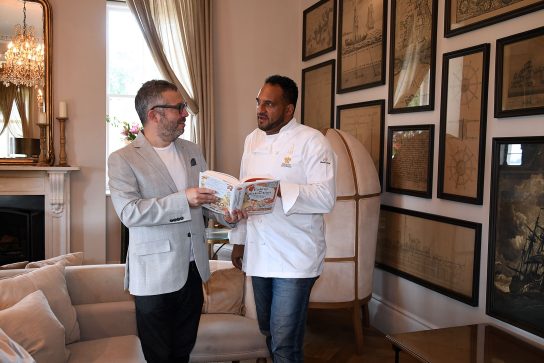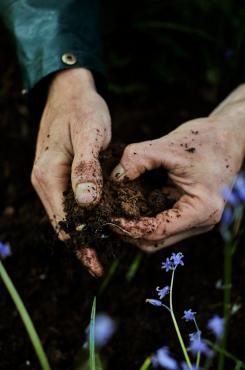Slow food for thought
Published 20 December 2022
Chloë Hamilton
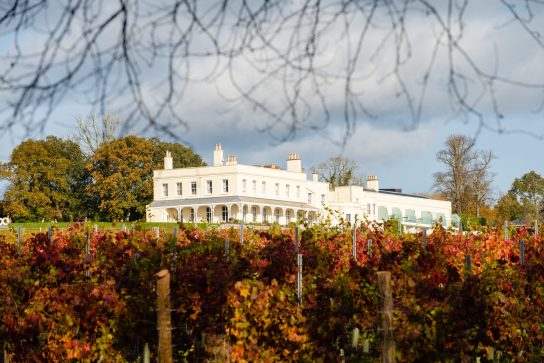
With biodiversity a hot topic on the world stage, we look at what’s happening to protect nature’s larder on home turf.
This week Cop15 closed with an historic deal struck to conserve 30% of the world’s ecosystems by 2030. The UN’s biodiversity conference in Montreal, co-hosted by China and Canada, involved almost 200 governments from around the globe pledging to steer away from a course toward environmental destruction.
The ’30 by 30′ deal is a promising outcome at a time when the preservation of biodiversity has become more urgent than ever. But the hard work starts at ground level and this is where hospitality — operating at the crucial juncture between supplier and consumer — can push for change in both perception and practice.
In October, Relais & Châteaux, the global network of 580 independently run hotels, hosted their own conference of the parties. Food for Change 2022, in alliance with the Slow Food organisation, took place over three days at Lympstone Manor in South Devon against the backdrop of sweeping views over the Exe estuary. The delegates were five-star chefs from Relais & Châteaux hotels across the UK and the agenda was to share best practices to protect biodiversity and culinary heritage.
While luxury hotels might not be the first place you’d expect to see sustainability campaigns in action, Relais & Châteaux presented their charter to UNESCO back in 2014 and have since been working to preserve natural diversity on a global scale. As the head delegate for Relais & Châteaux UK and Ireland, chef Michael Caines MBE hosted this year’s conference and was joined by Luke Matthews of Chewton Glen, Simon Crannage of Grantley Hall, Tom Scade of The Vineyard and Stephen Hayes of Cashel Palace.
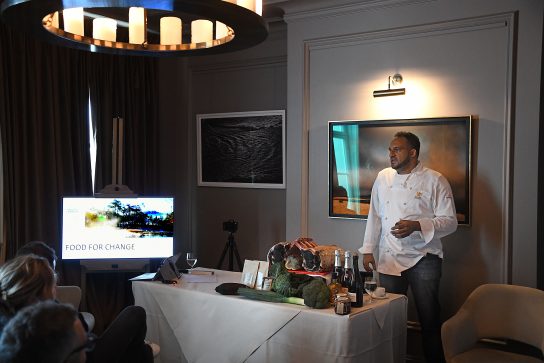
One of the cornerstones of the conference was the Ark of Taste – an international catalogue of small-scale, quality foods that are either lesser known or face extinction due to industrial farming, environmental deterioration or disappearance of cultural traditions. The project is coordinated by Slow Food and features more than 5,000 varieties worldwide, 200 of which are contributions from the UK. Examples include Stichelton, Manx Loaghtan sheep, Jersey ormer, Shetland Black potatoes and Bath Chaps.
On the final day of the Food for Change conference, each Relais & Châteaux chef in attendance cooked a dish to celebrate the produce they have nominated for the Ark of Taste. Shane Holland, executive chairman of Slow Food UK, highlighted the importance of their contribution to what he calls the living bank of flavour: ‘These chefs are some of the last vanguards of slow food.’
First up was Simon Crannage, executive chef at Grantley Hall overseeing a brigade of 54 chefs across five separate restaurants. The kitchen garden might look well manicured but ‘we have the correct regenerative processes in place,’ he says. His dish featured pickled vegetables grown in a no-dig crop rotation system, paired with Crowdie – an increasingly rare Scottish fresh cheese which dates back to the Viking era. This one, made by the small scale Yellison’s Farm near Skipton, uses goat’s milk for production.
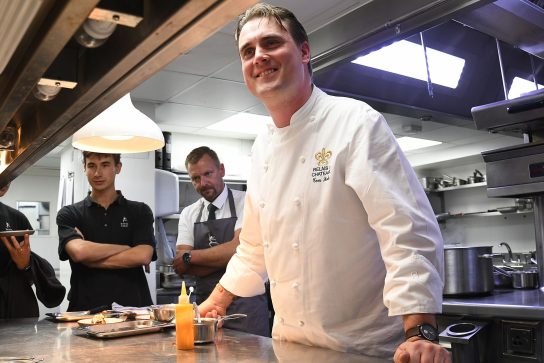
Next was Tom Scade, executive chef of The Vineyard in Newbury. His Ark of Taste ingredient was Berkshire pig which he first came across in Japan. ‘It’s like the pork version of Kobe beef,’ he explains. Vicars Game is his trusted source and he takes all the cuts they can for the restaurant. Scade’s Food For Change dish used the trotters for a magnificent pig trotter cake with celeriac and apricot. He said of it: ‘I like to put things like this on the menu to challenge people’s expectations’.
Luke Matthews was next to the pass. 2023 will mark an impressive 30-year tenure at Chewton Glen. Over that time the chef has built close working relationships with local Hampshire suppliers, including the father-and-son business producing Alre watercress, whose culinary heritage dates back to the 1500s. ‘Winchester is famous for its watercress and these are some of the last people that hand harvest it,’ said the chef. ‘If we don’t use it, we’ll lose it.’ He paired the peppery watercress with Chalk Stream trout, cock crab and foraged sea vegetables.
Rounding off with a sweet note was Stephen Hayes, culinary director of Cashel Palace in Tipperary, who brought the Ard Cairn Russet apple to the table. ‘I was shocked to find how few ingredients in the Ark of Taste were from Ireland,’ Hayes said. ‘Four or five cheeses from Tipperary alone meet the criteria. There are so many fantastic Irish producers using regenerative techniques yet so many of their ingredients are in danger of becoming extinct. It’s up to us to protect this identity.’
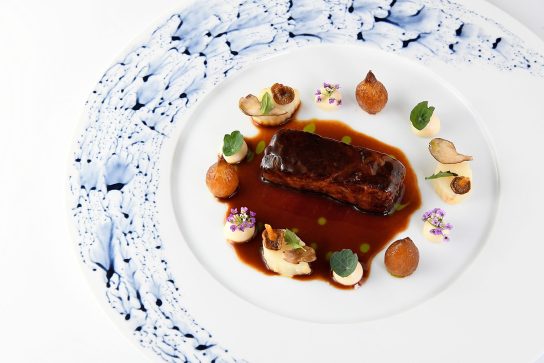
After the tasting, lunch followed with Michael Caines preparing the star dish of braised Ruby Red beef cheek, showcasing his own contribution to the Ark of Taste catalogue. Darts Farm, the suppliers of this slow growing, heritage breed and nearby neighbours to Lympstone Manor, rear the cattle with traditional regenerative practises involving rotational grazing on the fertile banks of the River Clyst.
As well as being a thriving third-generation family farming business, Darts Farm have worked hard to communicate the importance of regenerative and biodiverse production to the wider community. Starting out with a pick-your-own initiative, the business has proliferated into a farm shop, restaurant, butchery, winery, chocolatier and gelateria. ‘It’s a place you can come and spend the whole day,’ explains George Dart, an inspiring ambassador for the farm (you can read more about him in CODE’s 30 under 30 list here).
With the chef delegates galvanised to continue contributing to the valuable Ark of Taste catalogue, the Food for Change conference for 2022 closed with Caines reflecting on the responsibility that comes with a chef’s pivotal position: ‘As a collective of Relais & Châteaux chefs we have a platform to showcase wonderful ingredients, ensuring historic supply chain are supported, as well as promoting farming techniques that protect the environment. We have a vital role to play. We are the storytellers’.
